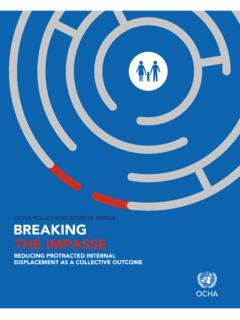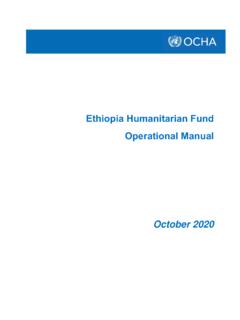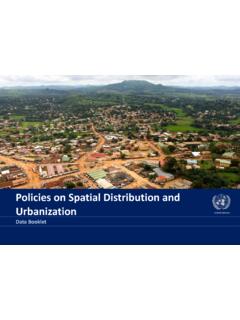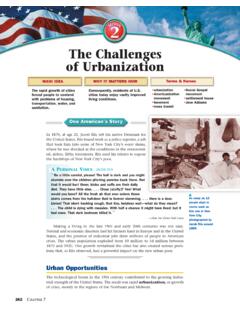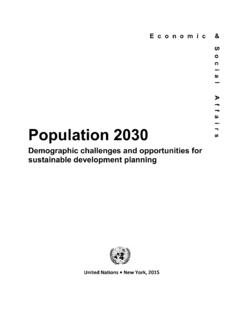Transcription of Global Challenges and their Impact on International ...
1 Global Challenges and their Impact on International Humanitarian Action January 2010 Kirsten Gelsdorf OCHA Occasional Policy Briefing Series No. 1 OCHA Occasional Policy Briefing Series Brief No. 1: Global Challenges and their Impact on International Humanitarian Action Policy Development and Studies Branch (PDSB) 2 For more information, please contact: Policy Development and Studies Branch UN Office for the Coordination of Humanitarian Affairs (OCHA) E-mail: Tel: +1 917 367 4263 These occasional policy briefs are non-papers. They were produced primarily for internal circulation and serve as a basis for promoting further discussion and policy analysis in their respective areas. They do not necessarily represent the official views of OCHA. They are available online on under policy and issues. OCHA, PDSB 2010 OCHA Occasional Policy Briefing Series Brief No. 1: Global Challenges and their Impact on International Humanitarian Action Policy Development and Studies Branch (PDSB) 3 I.
2 INTRODUCTION 1. Humanitarian stakeholders are increasingly concerned about the impacts of current or emerging Global Challenges , such as climate change, the food crisis and financial crises, extreme poverty, urbanization , water scarcity, energy security, migration and population growth, on the caseloads that humanitarian agencies work with and the operational environments they will have to work in. While anticipating the evolution of these Challenges propelled by various political, economic, legal, demographic, environmental, and technological factors is a complex task at best, it is clear that their individual and combined impacts are already shaping, and will continue to shape International humanitarian action. 2. Yet, most International humanitarian actors are still not sufficiently focused on the future implications of these Challenges both individually and collectively, even though in many cases they may be, by default or design, the actors called upon to adapt and respond to them.
3 3. In order for International humanitarian actors to be able to plan and react accordingly, they should consider two main questions: Caseloads: In what ways do today s Global Challenges Impact emerging humanitarian needs? Operational Environment: How will today s Global Challenges Impact the environments in which International humanitarian actors will operate? Finally, in order for OCHA to be able to stay fit for purpose, it should then consider the question: Humanitarian Coordination: What will these impacts on caseloads and operational environments mean for International humanitarian coordination? 4. The following occasional paper provides a preliminary analysis that aims to address these three questions. In doing so, it emphasizes three main conclusions for further discussion and debate: (1) The humanitarian community may need to broaden its notions of vulnerability and risk, reconsider what drives a humanitarian emergency and, subsequently, what triggers an International humanitarian response.
4 A new type of humanitarian emergency may emerge: one not caused by a definable event or process, but rather by the confluence of Global Challenges ; (2) While traditional inter- and intra-state conflicts will continue, insecurity will also stem from instability and violence driven by the intersection of non-traditional threats from natural resource scarcities, volatile markets, and structural trends, such as urbanization and extreme poverty tipping-points; and, (3) There will increasingly be a need to transcend traditional definitions of what is humanitarian and what is developmental to advance toward more integrated country plans and partnerships that look to simultaneously promote actions that increase resilience in the short-term and reduce overall vulnerability in the long-term. OCHA Occasional Policy Briefing Series Brief No. 1: Global Challenges and their Impact on International Humanitarian Action Policy Development and Studies Branch (PDSB) 4 5.
5 As a next step, OCHA should examine the validity and significance of these projected impacts and conclusions on the organization s overall adaptability and resilience to respond, mitigate, and, where possible, capitalize on the changes these Global Challenges portend for the humanitarian landscape. II. Global Challenges What are Global Challenges ? 6. For the purposes of this paper, Global Challenges will be defined as any major trend, shock, or development that has the potential for serious Global impacts and thus to create humanitarian needs and change the environments in which humanitarian actors will operate in coming years. Below is a non-exhaustive list of Global Challenges we have identified: Climate change: With a predicted increase in temperature that will indirectly lead to the disappearance of territory, spark widespread (and, in many cases, permanent) displacement (already 20 million people are estimated to have been temporarily displaced by climate-related disasters in 2008, a comparable number to the 26 million conflict-related IDPs in the same period), change morbidity disease patterns, and promote a monumental shift in Global policies, climate change will fundamentally transform the way humanity approaches Global security and livelihood sustainability.
6 Extreme poverty and inequality: With a marked increase in extreme poverty and profound inequalities of income and wealth plaguing most nations (as approximately half the world s population lives on less than 1% of its wealth), extreme poverty and inequality continue to leave whole communities and households in an almost irreversibly devastating state of vulnerability and need. Financial and economic crisis: With the world economy now predicted to contract by , remittances which accounted for some 2% of the major developing countries GDP in 2007 having decreased to in 2008 and falling by an additional this year, private capital flows dropping by some $700 billion compared to previous years, and an additional 90 million people being pushed into poverty, the financial and economic crisis is leading to unemployment, an increase in poverty, and the curtailment of critical safety-nets, thereby threatening an even larger caseload in need of humanitarian assistance.
7 Food crisis: With over 1 billion people worldwide (one-sixth of the world population) suffering from hunger, over 30 cases of food-related unrest having erupted around the world since 2008, 25,000 children dying daily from malnutrition, 2 billion people currently suffering from micro-nutrient deficiencies, local food prices in most developing countries being too expensive for hundreds of millions of people, disputes over depleting land resources, and projections that by 2025 food production will not be able to increase by the necessary 50% over current levels to keep up with population growth, the food crisis will continue to threaten lives and livelihoods worldwide. OCHA Occasional Policy Briefing Series Brief No. 1: Global Challenges and their Impact on International Humanitarian Action Policy Development and Studies Branch (PDSB) 5 Water scarcity: With the number of people who do not have access to safe water rising just over 1 billion to 2 billion by 2025 (roughly one third of the world population), water scarcity represents a major political, economic and human rights issue driving vulnerability and conflict.
8 Energy security: With the projected one and a half times increase in energy demand by 2030, energy security could cause supply-side gluts stoking fears of scarcity and reigniting geopolitical rivalries, whilst also providing the impetus to invest in renewable energies. Migration: With the potential for hundreds of millions of people forced to uproot their lives and rebuild them across borders, continents and oceans, migration will be one of the biggest Challenges both within and across borders. Population growth and demographic shift: With a population that will grow from billion today to over 8 billion by 2025, and the number of people aged over 65 rising from 390 million now to 800 million in the same time frame, population growth and demographic shifts will put massive strains on Global resources and institutions. Localized demographic trends will also be a source of Challenges : the number of 15 24 year olds in the Middle East and North Africa region is unprecedented and set to rise as a proportion of population.
9 (In an extreme case, the Palestinian Territories are set to see an 84% increase in youth population between 2005 and 2025.) This trend, combined with the MENA region claiming the highest youth unemployment rates in the world, may be a source of further regional insecurities. urbanization : With an urban population that will double in Asia and increase by 150% in Africa between now and 2050, urbanization will create massive social inequities and risks as well as tangible health problems, malnutrition rates, unemployment, and income deficits, which represent an almost permanent threat to the security of billions. Health pandemics and infectious diseases: With projections that any large-scale influenza pandemic could result in from 2 up to 60 million potential deaths, and the discovery that infectious diseases that have been controlled historically are now demonstrating increased virulence, changing incidence, and shifting vectors of transmission, health pandemics and infectious diseases threaten to further degrade the lives of many, potentially increasing feelings of injustice and amplifying the pressures on weak and fragile states.
10 How do Global Challenges interconnect? 7. As seen in the above litany of anticipated Global Challenges , individually, these Challenges are already exacerbating vulnerability and increasing humanitarian needs. But it is the intersection of any number of these Challenges and their interconnectedness that is likely to even more significantly affect vulnerability and humanitarian needs. As recent crises in the outskirts of Harare, Mogadishu or Port-au-Prince have already illustrated, rapid urbanization , climate-related disasters, environmental degradation, and price spikes of fuel and basic food staples, when occurring simultaneously, can dangerously combine to severely undermine the economic, food, health and environmental security of communities, thus creating new vulnerabilities and new needs for emergency or life-saving assistance. Therefore, these Challenges can no longer be OCHA Occasional Policy Briefing Series Brief No.




